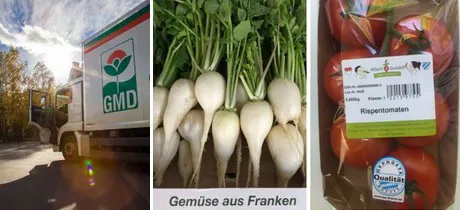Lettuce, carrots, radish: In a heat wave like we had last week, vegetable farmers have to come up with something, so that the goods still arrive fresh on the shelf.
Lettuces, carrots, radish and cauliflower are currently piled up in green boxes in the cold store of the Gartenbauzentrale Main-Donau. The air conditioning is running at full power, but that's hardly enough, as Werner Hopf makes clear in an interview with BR24. He is managing director of the cooperative, to which the vegetable farmers from the region deliver. 
Vegetables must be cooled down to four degrees
The recent heat wave has presented the farmers with great challenges. If the goods go from the field into the cold stores, they are currently still quite warm, says Hopf: "We have to maintain the continuous cold chain and now have the problem to get the temperature in the cores of the vegetables down to the required four degrees."
According to him, this is what the big supermarkets and discounter chains demand. But cold storage is far from the only problem: In the case of white radish, for example, pests have proliferated in the heat, according to Hopf. And they are very hard to fight. That is why the radishes currently have blemishes at times - especially in the summer, when people especially appreciate the vegetables.
"Blemishes are not accepted by the trade!"
You can cut away the bad spot; The taste of the radish will be excellent. But: "blemishes are not accepted by the trade!" At this time, the same applies for crooked vegetables. That's why Hopf always has to accept returns from retailers. The vegetables are then composted instead of landing on a plate.
Source: BR24
For more information:
Gartenbauzentrale Main-Donau eG
Seebachstrasse 36
97320 Albertshofen
Tel: 09321/3007-90
Fax: 09321/3007-82
Mobile: 0175/2070322
kai.fuchs@gbz-main-donau.de
www.albert-gundel.de
